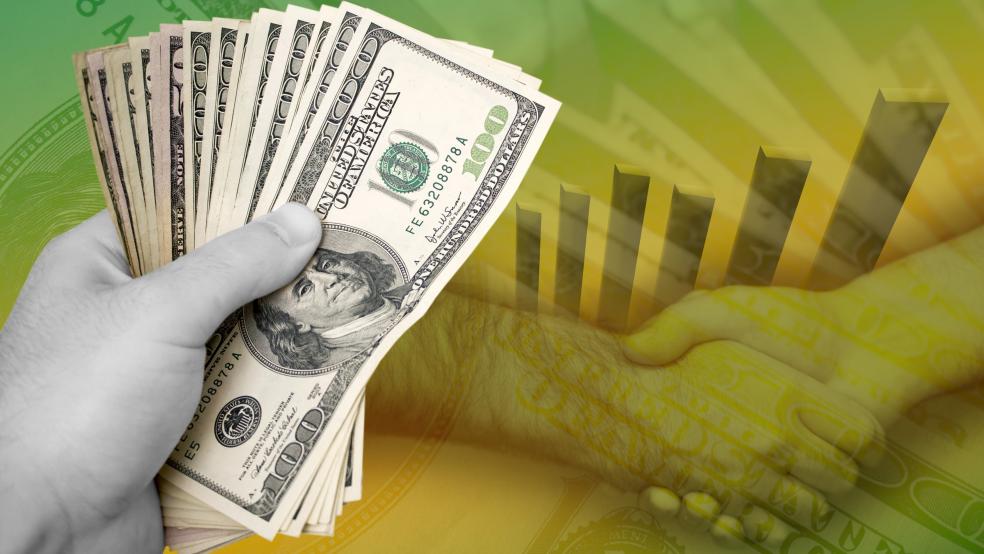K Street, the euphemism for influence peddlers in Washington, is the center of the swamp that President Trump said he would drain.
But early indications are that changes in Obama-era lobbying rules along with overhauls of health care, financial industry regulations, the tax code, and immigration policy could keep the swamp alive. Trump's litany of executive orders could bring the fat times back for the army of former government officials, lawyers, and operatives who represent corporate America, Wall Street, Big Pharma, agriculture interests and any other group with an agenda.
Related: How Big Pharma Lobbyists Keep Medicare Drug Prices High
Bruce Mehlman, a Republican lobbyist at Mehlman Castagnetti Rosen & Thomas, told The Hill that “companies and associations are gearing up for significant reform opportunities occasioned by an energetic new administration taking office with a supportive Congress.”
There was a significant drop last year in the amount of money spent on lobbying -- $3.1 billion, the smallest number since 2007 -- and the number of registered lobbyists decreased 3.2 percent from 2015, according to the Center for Responsive Politics (CRP).
The Hill reported that 9 out of 11 lobbying firms that had revenue of more than $15 million in 2016 saw an election-year decrease over 2015. Even Akin Gump Strauss Hauer & Feld, a K Street powerhouse, earned $36 million last year, compared with $39 million in 2015.
But the Trump Administration is expected to usher in more prosperous days. One reason is that the rules of engagement have changed.
Related: Trump Puts Five-Year Lobbying Ban on his Political Appointees
Among the chief differences between the Obama and Trump rules is that while officials the new President appoints cannot lobby the agency for which they worked for five years after leaving office, they can lobby other agencies. And lobbyists can join the Administration if they avoid working on policies they previously sought to influence.
In a statement after Trump laid out his lobbying rules last week, the bipartisan Center for Responsibility and Ethics (CREW) in Washington said that despite some positive features, his Executive Order was a step backward from reforms Obama had put in place.
The statement issued by CREW Chair Norman Eisen, an ethics adviser to Obama, and Vice-Chair Richard Painter, an ethics adviser to George W. Bush, said in part: “[The Trump EO] removes the ban on lobbyists going to work in the agencies that they lobbied. …It’s as if their former employers have embedded agents of influence in the government.”
Trump’s order allows lobbyists to work in his Administration as long as they are not involved in issues about which they lobbied in the two previous years. The Obama rules flatly barred anyone from joining his Administration if they had been registered lobbyists during the preceding year.
Obama administration officials were also restricted from contacting their former agencies for two years after leaving office. Under Trump’s EO, that is down to one year except for Cabinet-level officials.
In an interview with Politico, Eisen said: "The single biggest insulation that we had, in retrospect, against scandal in the Obama administration was the two-year exit ban. People will pay you to put you on ice for one year and then after that year is up to ply your contacts. But no one wants to pay you to put you in cold storage for two years."
The CREW statement also said that Trump “removes Obama’s additional revolving door restrictions on non-lobbyists when they leave the government. This is another important problem in the tilted special interest playing field: shadow lobbying by those who are not registered and attempt to influence the system. Instead of continuing the Obama restrictions, or even making them tougher, Trump has eliminated them.”
In the last three months of 2016, “the number of registered lobbyists dipped to 9,050 — the smallest number since 2008, when quarterly filing began,” according to Ashley Balcerzak, writing for the CRP’s OpenSecretsblog.
Related: Loopholes in U.S. Lobbying Laws Undercut Reforms, Two Watchdog Groups Argue
But both Balcerzak and Politico suggest that there has been a rise in shadow lobbying – exerting influence while skirting the Lobbyists Disclosure Act. Trump promised to close loopholes in the act, but that would require legislation. However, his EO did broaden the definition of lobbying to includes “preparing and strategizing for contacts that other people make, so it goes further than only restricting registered lobbyists,” Politico said.
One factor that could loom large as industries and various other groups with an agenda consider how much money to devote to lobbying is the uncertainty about what lies ahead in a Trump Administration. As Thomas Susman, director of governmental affairs at the American Bar Association, told OpenSecrets, “That [uncertainty] leads to interests wanting to get their perspective out there.”





